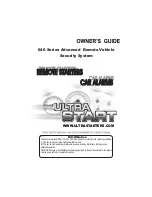
Page 6
If you choose to use an aerosol smoke product to test the smoke alarm, be certain to use one
that has been Listed to Underwriters Laboratories, Inc. Safety Standards and use it only as
directed. Use of non-UL Listed products or improper use of UL Listed products may affect
the smoke alarm's sensitivity.
NUISANCE ALARM SILENCE FEATURE:
This feature is to be used only when a known alarm
condition, such as smoke from cooking, activates the smoke alarm. The smoke alarm Silence
Feature is activated by pushing and releasing the Silence button on the smoke alarm cover while in
alarm condition. The smoke alarm will automatically reduce sensitivity and the red LED will blink on
approx. every 10 seconds to indicate the alarm is in the Silence mode. The smoke alarm will gradually
regain normal sensitivity and sound the alarm if particles of combustion are still present. The 8-12
minute Silence feature may be used repeatedly until the air has cleared, by pushing and releasing
the Silence button again. Resetting the smoke alarm after a nuisance alarm is recommended.
NOTE: If the Test button is pressed and held during the Silence mode, the smoke alarm will be
tested normally. Upon the release of the Test button, the Silence mode will be restarted.
Before using the alarm Silence Feature, identify the source of smoke and be certain that safe
conditions exist.
Clean the smoke alarm at least once a month
to remove dust, dirt, insects or debris. Always turn
off power to smoke alarm before cleaning. Using a soft brush or wand attachment to a vacuum
cleaner, vacuum all sides and cover of smoke alarm. Be sure all the vents are free of debris.
BATTERY REPLACEMENT
The smoke alarm uses a 9 Volt battery. The battery should last for at least one year under normal
operating conditions. The smoke alarm has a low battery indicator, an audible beep or chirp. It will
operate at approx. 40 second intervals for a minimum of 7 days. When this indication occurs, replace
the battery with an Alkaline type (Duracell MN1604, Energizer #522) or Lithium type (Ultralife U9VL-
J) from your local retailer.
LITHIUM Battery Models only - The LITHIUM battery is warranted to last for 10 years under normal
operating conditions. Replace the battery with only LITHIUM type: (ULTRALIFE: U9VL-J).
OPTIONAL BATTERY DRAWER TAMPER LOCKING PIN: To make your battery drawer tamper
resistant, a locking pin has been provided (breakaway part on mounting bracket).
NOTE: If this feature has been activated, you will need to deactivate it by removing the battery
drawer tamper pin located at side of battery drawer. Refer to Page 5.
Pull the QUICK DRAW
®
battery drawer open and remove the battery. While observing polarity, push
the replacement battery into the battery drawer until it is held securely in place. Carefully close the
battery drawer and reinstall the tamper pin.
Test the smoke alarm by pushing the TEST button on the smoke alarm cover until the alarm sounds,
then release.
IMPORTANT:
Under normal conditions, the test button should sound the alarm immediately after it
is pressed. There are special conditions that, when you press the Test button, you will experience a
delay of approx. 10-15 seconds before the alarm sounds. This delay occurs if the test button is
pressed during a self-diagnostic period. This occurs: (1) Upon initial power up; (2) After battery
replacement. Retest after 10-15 seconds.
REPAIRS AND SERVICES
This smoke alarms contains less than 1 microcurie (37 kilobecquerel) of Americium 241, a radioactive
material.
The distribution of these ionization-type smoke alarms is licensed by the U.S. Nuclear
Regulatory Commission; the consumer is exempt from any licensing or requirements.
If the
smoke alarm is defective in any way, do not tamper with the smoke alarm. Return the smoke alarm
for servicing. (See warranty for instructions or in-warranty returns.) There will be a service charge for
repairing out of warranty smoke alarms.
NEVER use an open flame of any kind to test this smoke alarm. You might accidentally damage
or set fire to the smoke alarm or to your home. The built-in test switch accurately tests the
smoke alarm's operation as required by Underwriters Laboratories Inc. (UL).


























